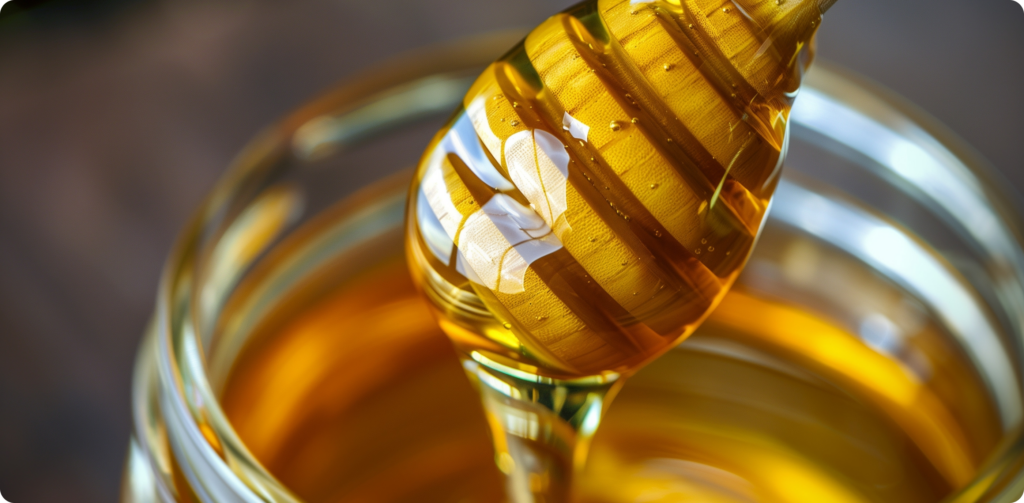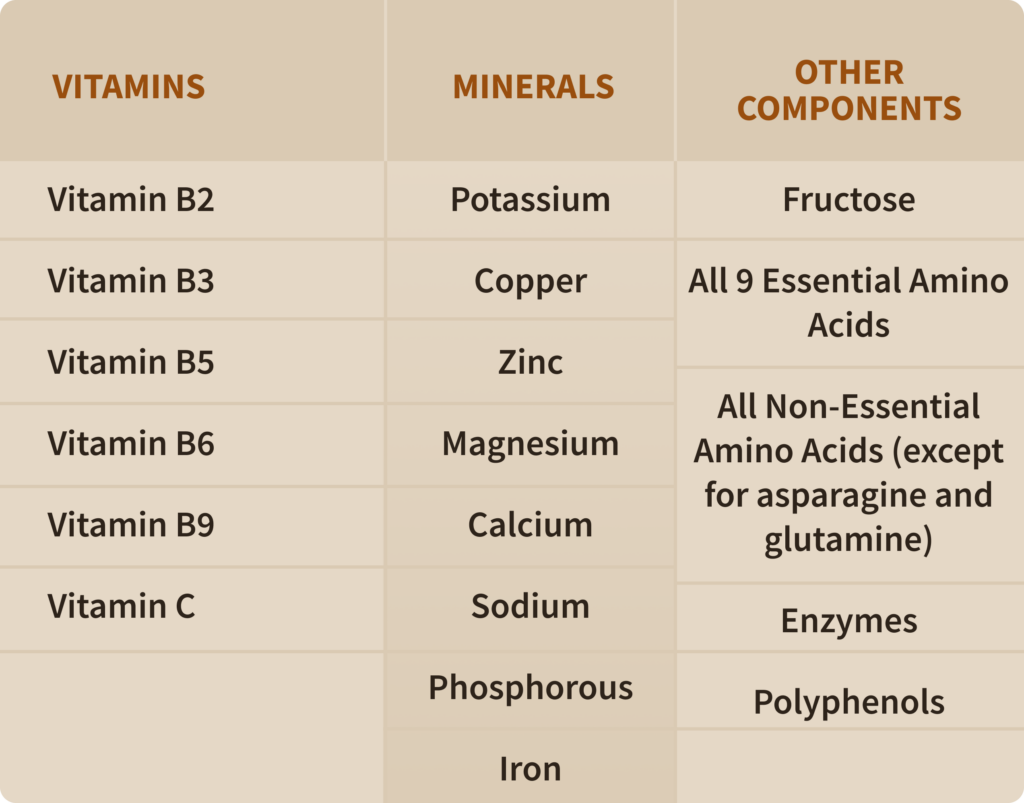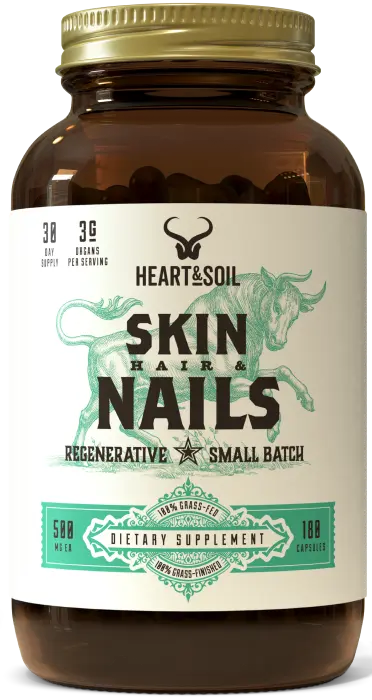PLEASE NOTE: The information in this blog is for educational purposes only. It is not a substitute for professional medical advice. Consult your healthcare provider if you’re seeking medical advice, diagnoses, or treatment.
Ancient civilizations in Egypt, India, China, and Rome may have had vastly different religious beliefs, environments, and lifestyles, but they all treasured honey (1).
Not only did people savor its sweetness, but they also used honey to treat wounds, burns, skin diseases, and gut diseases (2, 3). The Greeks viewed honey as an important contributor to longevity and vigor (4).

Today, honey is still used worldwide (and for good reason).
In this article, we’ll examine honey benefits and the many reasons why it has been a key fixture for over 8,000 years (5).
How Nutrient Dense is Honey?
There are over 300 types of honey, and their taste, odor, color, and nutritional value differ depending on the floral source the bees were exposed to (6).
In general, here’s what you can expect to find in honey (7, 8, 9):

One of the most impressive honey benefits is that it offers antibacterial, antifungal, antiinflammatory, antidiabetic, and antiviral properties (10, 11). This can help us fend off daily exposure to bacteria, parasites, and viruses (12).
To sweeten the deal even more, honey doesn’t spoil (when stored properly)(13).
An important consideration when buying honey is the difference between raw honey and pasteurized honey.
Raw honey is generally extracted from the hive, strained, and bottled. On the other hand, regular honey is pasteurized (exposed to high heat) and then filtered to remove bacteria and improve appearance.
This added level of processing can decrease the probiotic bacteria and antioxidant potential found in raw honey (14). It may also lead to the formation of carcinogens such as 5-hydroxymethyl furfural (HMF)(15).
The Incredible Benefits of Honey
Raw honey is the most ancient natural sweetener and offers an impressive resume of potential benefits (16). Honey benefits may extend to these areas of the body:
Skin
Honey is the oldest known wound-healing agent (17). Now, it’s known that honey can be effective against diabetic ulcers, burns, boils, scratches, and other wounds (18).

Physicians in countries like Germany and France still use honey to treat surface wounds and burns (19). Given its low cost and ability to fend off bacteria, it’s emerging as an alternative to antibiotics for wound care (20). Manuka honey, in particular, can lead to faster wound healing and elimination of bacteria.
Honey is also incorporated against dandruff, dermatitis, psoriasis, eczema, and many other skin ailments (21, 22).
Brain
Honey contains polyphenols that have been shown to protect against Alzheimer’s disease, Parkinson’s, depression, and other neurological disorders (23, 24, 25). Honey has also been shown to possess memory-enhancing effects and can assist with central nervous system development (26).
Cardiovascular
Cardiovascular disease kills millions of people each year, with an estimated 31% of global deaths (27, 28).
Honey benefits can extend to cardiovascular health as well. Honey has been shown to improve risk factors for both healthy and at-risk individuals (29). It has the potential to restore heartbeats, reduce blood pressure, and modulate oxidation (30).
Honey contains various polyphenols (such as quercetin) that may offer protection against cardiovascular complications (31, 32).
Gut

Traditional Ayurvedic texts viewed honey consumption as a powerful tool for weak digestion (33). Like in ancient times, honey is still used for digestive issues such as gastroenteritis, gastritis, and ulcers (34). Honey can also help relieve both constipation and diarrhea (35, 36).
The majority of the immune system is found in the gut, and raw honey offers probiotic bacteria that can support immune system regulation (37). These probiotics may help prevent infections, alleviate lactose intolerance, and improve stool quality (38).
Honey may also protect against H pylori, salmonella, and other infections or bacteria that can negatively impact the gut (39, 40).
Oral Health
While it may seem counterintuitive, given its sugar content, honey can actually be a powerful way to improve oral health.
Honey can support dental health due to its antibacterial properties (41). It can significantly reduce dental plaque and prevent dental caries (42, 43, 44)
Eyes

People have managed or treated eye diseases using honey for thousands of years (45).
For example, dry eye is a major issue with no cure, but manuka honey can help manage it (46). Honey is also implemented against keratitis, corneal injuries, and conjunctivitis (47).
Miscellaneous Honey Benefits
The honey benefits don’t stop there. Other potential benefits of raw honey include:
- As part of a healthy diet, honey may improve glycemic control (48).
- Honey can improve athletic performance and reduce inflammation following exercise (49)
- When paired with exercise, honey can promote bone health (50)
- Honey can be a helpful tool against antibiotic-resistant bacteria (51)
- Honey has shown the potential to be cytotoxic towards cancer cells (52, 53)
- The immune system can be boosted naturally using honey (54, 55)
- Consuming honey may enhance fertility in both men and women (56)
Now we can see why ancient and modern civilizations have cherished this food!
Tips for Sourcing High-Quality Honey & Concerns to Be Aware Of
Even though honey can be incredibly beneficial, there are some risks to be aware of.
Although rare, some are allergic to bee pollen, honey, or similar items (57).
While bees typically forage close to their hives, they can venture out for miles and inadvertently come into contact with pesticides and other potential toxins (58, 59).

Honey is commonly contaminated with heavy metals, pesticides, and other potential toxins (60). Heavy metals like lead, arsenic, mercury, and lead have been found in honey, and these are known to negatively affect human health (61, 62).
Honey consumers are also becoming concerned about glyphosate exposure. Glyphosate is a non-selective herbicide used in massive quantities globally, yet there is little consensus regarding its safety (63).
Even though organic foods are supposed to be grown or raised without glyphosate, one study found that over 45% of organic honey contained glyphosate (64). This can happen through air drift, water, or the bees coming into contact with glyphosate.
Honey products are commonly counterfeit, and you may be unable to tell without lab testing (65). Beekeepers or companies may add artificial sweeteners or feed the bees refined sugar (66), resulting in highly processed honey filled with added sugars.
There are no perfect options, but these challenges can be avoided or minimized by:
- Buying local honey to understand better the environment and practices used to produce it
- Buying organic honey
- Seeking out companies who test for contaminants and are willing to share the results
- Considering glyphosate-free honey from companies like Heavenly Organics or Lineage Provisions
Honey & The Timeless Power of Animal Foods
Like many animal foods, honey has been intertwined with the human diet for eons. Not only does it taste great, but it can also be a simple, cost-effective way to improve heart health, weight management, and mental health.
The full picture of health benefits from honey is yet to emerge, but it’s easy to see why honey has lasted the test of time.
Skin, Hair & Nails
Beauty from the Inside Out
Subscribe to future articles like this:
